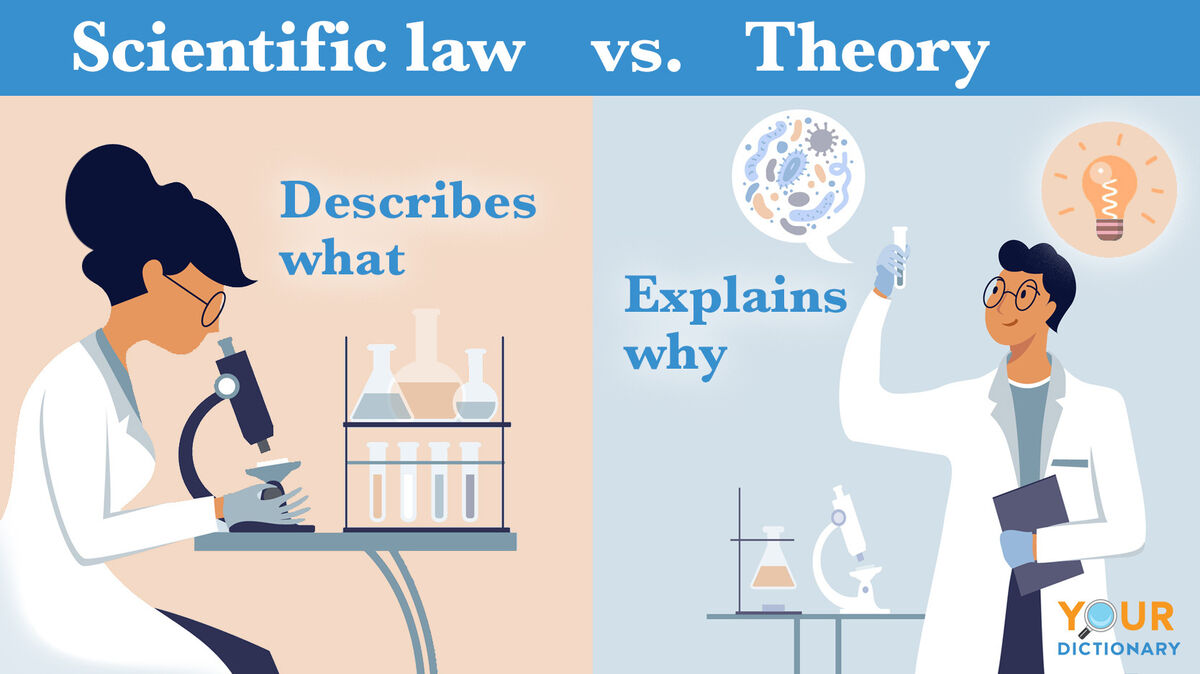
When reviewing scientific research or information about the world around you, it's important to know how to separate scientific law from theory. These closely related terms are similar yet not the same. Discover that both are equally important components of the scientific method as you explore scientific law vs. theory.
Scientific Law vs. Theory: What Is the Difference?
The most basic difference between scientific law and scientific theory is as simple as the difference between "what" and "why."
What Is Scientific Law?
A scientific law focuses solely on describing what. A scientific law provides a description of a directly observable phenomenon. It describes what will or is expected to happen in a certain set of circumstances.
What Is Scientific Theory?
What is a scientific theory explores why. A theory is about underlying causes, seeking to explain the reason the phenomenon occurs. The focus of a theory is to provide a logical explanation for things that occur in nature. There can be more than one theory about the same phenomenon.
Can a Theory Become a Law?
The idea that a scientific theory could become a law once proven to be a fact is a common misconception. In science, laws and theories are two different types of scientific facts. A scientific theory cannot become a scientific fact, just as no explanation (theory) could ever become a description (law). Additional data could be discovered that could cause a law or theory to change or be disproven, but one will never become the other.
Quick Tip: Remembering Law vs. Theory
To easily tell the difference, remember that laws describe "what" and theories explain "why." Consider using a mnemonic device such as "look down towards Earth" to help you remember the difference.
- laws - look
- describe - down
- theories - towards
- explain - Earth
Scientific Law Examples
Scientific laws are formed through repeated observations or experiments. They begin with a scientific hypothesis and are developed via scientific study that provides empirical information and data analysis. There are many examples of scientific laws.
- law of conservation of energy - The law of conservation of energy states that energy can't be created or destroyed. It can only be changed into a different form or transferred to another object.
- law of cosmic expansion - Edwin Powell Hubble is behind the law of cosmic expansion. Often referred to simply as Hubble's Law, it states that galaxies move in a direction away from one another. This motion occurs at a fixed velocity in proportion to distance.
- laws of motion - Sir Isaac Newton identified three laws of motion.
- Newton's first law of motion indicates that an object will stay in its current state (rest or motion) unless affected by a force.
- The second law of motion says that when a force acts on an object, its change in velocity depends on its mass.
- The third law of motion states that every action produces a reaction that is equivalent and opposite.
- law of orbits - Johannes Kepler's law of orbits indicates that planets move around the sun in an elliptical manner. This means that the planets follow a set, oval-shaped pattern around the sun.
- law of universal gravitation - Newton's law of universal gravitation indicates that everything in the universe that has mass is attracted toward the center of the Earth. This attraction is called gravity.
Notice that each of the above laws describes a phenomenon, but does not seek to provide a reason that the phenomenon occurs. Providing an explanation of why is the job of theory, not law.
Scientific Theory Examples
Scientific theories are formed via the scientific method. As with laws, every theory begins with a scientific hypothesis, which must be carefully researched. If there is sufficient evidence to support that the hypothesis provides a valid explanation for a phenomenon, the hypothesis can become a theory.
- atomic theory - Atomic theory indicates that all matter is made up of atoms, which are microscopic particles that cannot be divided, created or destroyed. It explains why substances composed of one element (such as pure gold) are different from items that consist of multiple elements (such as a metal alloy).
- big bang theory - The big bang theory suggests that the universe began many billions of years in the past as a result of an expansion event of great magnitude. This universal expansion is continuing on an ongoing basis.
- germ theory of disease - The germ theory of disease posits that many diseases are caused by germs. These pathogens are tiny microorganisms that find their way into the body.
- plate tectonic theory - The theory of plate tectonics indicates that the Earth's outer layer is divided into a few dozen plates rather than being a solid surface. These plates make up the solid crust of the planet. They move relative to one another, above the Earth's mantle, which lies between its crust and the core.
- theory of evolution - The theory of evolution suggests that all species are related to each other and change (evolve) over time. This notion was first posited by Charles Darwin in the mid 19th century. His early theory focused on the role of natural selection in evolution.
Notice that each of the above theories provide an explanation for a phenomenon that has been observed. Some are universally accepted, while others are under debate. They are not, however, just guesses or thoughts about possible causes for events. Instead, they have been thoroughly studied using the scientific method.
Build a Strong Vocabulary of Science Terms
Now that you know the difference between a theory vs. scientific law, you are on your way to developing a strong vocabulary of science-related terminology. Continue exploring key scientific words by reviewing this collection of science terms made simple. Everything you learn will help you be better able to understand and discuss scientific concepts.